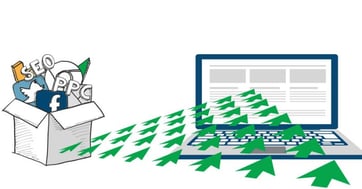AI-powered lead generation reshapes how businesses attract, engage, and convert prospects. Traditional methods like manual outreach and intuition-driven sales strategies are being replaced by data-driven automation and intelligent algorithms.
Companies leveraging AI can streamline prospecting, personalize outreach at scale, and optimize lead nurturing strategies with unprecedented precision. However, while AI enhances efficiency, the human touch remains crucial in fostering trust and closing deals. This article explores how AI-driven tools, strategies, and metrics transform lead generation, helping businesses capture attention and drive conversions.
The Evolving Landscape of Lead Generation in the AI Era
Sales is no longer just about the art of persuasion—it is about survival in an AI-driven world. Traditional sales methods like gut instinct, cold calls, and manual lead tracking are becoming obsolete. In their place, predictive analytics, automation, and conversational AI transform how businesses engage with customers, analyze data, and drive revenue.
According to research from Columbia Business School, AI and automation are revolutionizing sales from lead generation to deal closing. Companies that fail to adapt to these advancements risk falling behind competitors who use cutting-edge AI tools to sell smarter and faster. However, human relationships remain critical in high-value sales despite AI's growing role. Striking the right balance between automation and personalization is essential for long-term success.
One of the most significant changes in sales organizations is the rise of go-to-market (GTM) engineers. These specialists replace traditional sales operations roles, focusing on internal automation and optimizing sales workflows. Rather than relying solely on sales reps to manage CRM systems and analytics, GTM engineers develop AI-powered solutions that enhance efficiency and effectiveness. This shift allows businesses to accelerate sales cycles, eliminate repetitive tasks, and focus on strategic interactions.
AI-Powered Tools and Techniques for Identifying and Nurturing Leads
AI has evolved beyond simple sales assistance into full-fledged automation for lead generation. AI-powered tools can now handle tasks in sequence, from prospecting and targeting to outreach and engagement, creating an efficient and data-driven sales process. Some of the most effective AI-driven lead generation techniques include:
1. AI-Driven Prospect Identification
AI can analyze vast amounts of data from multiple sources to identify high-potential leads. By using predictive analytics, AI tools assess customer behavior, purchase history, and online interactions to determine which prospects are most likely to convert. Platforms like Apollo.io and Clay.com use AI to refine ideal customer profiles and uncover new opportunities.
2. Automated Multi-Channel Outreach
AI agents now handle multi-channel campaigns across email, LinkedIn, and other platforms. These tools personalize outreach messages, optimize timing, and adjust messaging based on prospect responses. Tools like LeadGenius are in charge of AI-driven outbound strategies, allowing businesses to scale their prospecting efforts while maintaining a human-like touch.
3. Conversational AI and Chatbots
AI chatbots and virtual assistants engage leads in real time, answering questions, qualifying prospects, and booking appointments. These tools, powered by natural language processing (NLP), can handle a high volume of inquiries and ensure that only qualified leads are passed to human sales representatives. Companies like Drift and Intercom leverage AI-driven chatbots to streamline customer interactions and improve lead conversion rates.
4. AI-Powered Lead Scoring
AI enhances traditional lead scoring by continuously analyzing engagement patterns, intent signals, and behavioral data. This allows sales teams to prioritize leads that are most likely to convert. AI-driven scoring models adapt over time, refining criteria based on past successes and failures.
Strategies for Personalizing Lead Magnets and Offers
While AI excels at automating lead generation, personalization remains the key to capturing attention and building trust. Lead magnets, such as eBooks, webinars, and free trials, must evolve to remain effective in an increasingly saturated digital landscape. Here’s how businesses can leverage AI while ensuring a personalized touch:
1. Segmenting Audiences for Hyper-Personalization
AI can help segment audiences based on demographics, behaviors, and preferences, allowing businesses to create tailored lead magnets for different customer groups. By analyzing engagement data, AI tools suggest content formats and topics most likely to resonate with each segment.
2. Dynamic Content Generation
AI-powered content generation tools can personalize headlines, subheadings, and body text based on user data. For example, inserting a prospect’s name, industry, or job role into an email subject line can significantly increase open rates. Dynamic text replacement and conditional logic ensure that lead magnet content speaks directly to the prospect’s specific needs and pain points.
3. AI-Generated Interactive Experiences
Traditional lead magnets like static PDFs are becoming less effective. Instead, AI can power interactive experiences like quizzes, assessments, and customized reports. These tools engage prospects in real time and provide personalized insights, increasing the offer's perceived value. Platforms like Outgrow and Typeform allow businesses to create AI-powered interactive lead magnets.
4. Predictive Recommendations
AI can recommend relevant content or offers based on past interactions. By tracking user engagement across websites, emails, and social media, AI identifies patterns and suggests the following best action. This approach ensures that prospects receive highly relevant information, increasing the likelihood of conversion.
Measuring Lead Quality and Conversion Rates
AI-driven lead generation is only as valuable as the results it produces. Businesses must measure lead quality and conversion rates to ensure that AI-powered strategies drive tangible outcomes. Here’s how AI can help analyze and optimize lead generation performance:
1. AI-Enhanced Lead Scoring and Qualification
Machine learning-powered lead scoring models adapt based on real-time data, continuously refining the criteria for high-quality leads. To prioritize the most promising prospects, AI considers multiple factors, including engagement levels, buying signals, and firmographic data.
2. Predictive Analytics for Conversion Optimization
AI-driven analytics platforms analyze sales interactions and provide actionable insights. By identifying patterns in successful deals, AI helps businesses refine their outreach and messaging strategies to increase conversion rates.
3. Real-Time Performance Tracking
AI dashboards track key performance indicators (KPIs) such as response rates, engagement levels, and pipeline velocity. These insights enable sales and marketing teams to adjust their strategies on the fly, ensuring continuous improvement.
4. Sentiment Analysis and Customer Feedback
AI-powered sentiment analysis tools gauge prospect responses to determine overall interest and engagement. By analyzing tone, language, and sentiment in email replies or chatbot interactions, businesses can refine their approach to maximize positive engagement.
The Future of AI-Driven Sales: Balancing Efficiency with Personalization
The rise of AI-powered lead generation is reshaping the sales landscape. According to Columbia Business School, AI transforms go-to-market strategies, automates repetitive tasks, and enhances efficiency. However, human interaction remains essential despite these advancements, especially in high-value enterprise sales.
Businesses must find the right balance between AI-driven efficiency and human-led personalization. While AI handles prospecting, outreach, and lead qualification, sales teams should focus on relationship building, strategic negotiations, and consultative selling.
Companies that embrace AI while maintaining a human-centric approach will define the future of sales. By leveraging AI-powered lead generation tools and balancing automation with authenticity, businesses can drive sustainable growth and outperform competitors in the evolving digital landscape.
Are you ready to integrate AI into your lead generation strategy? Contact WSI to explore how AI-powered solutions can help you capture more leads, nurture relationships, and drive conversions.





